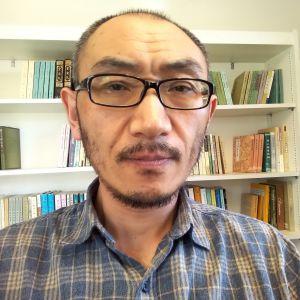Yugen Wang received his Ph.D. in East Asian Languages and Civilizations from Harvard University and an M.A. in Comparative Literature from Peking University. His primary research area is classical Chinese poetry and poetic thought, with a focus on the Tang and Song dynasties. In his book Ten Thousand Scrolls, he made an argument that the excessive allusiveness of the Jiangxi School patriarch Huang Tingjian’s (1045–1105) poetry and his emphasis on the importance of book reading for poetic composition should be understood in the larger historical shift from script to print that was intensely occurring in China at the time. His recent book, Writing Poetry, Surviving War, studies the works of the Northern Song Chinese poet Chen Yuyi (1090–1139) as he fled the Jurchen invasion during the massive political and geopolitical upheavals in China in the early twelfth century. The book demonstrates how Chen’s compact, practical, ideologically coherent, and technically precise poems epitomize the new style of writing in the Song that is markedly different from that of his Tang predecessors. Through detailed analysis of Chen’s poems, and the political conditions under which they were written, the book sheds intimate light into how a classical Chinese poet conducted his business, on the road, in crisis, and into the poet's inner strengths that psychologically and emotionally sustained him on the long excruciating journey. As Chen struggled and eventually reconciled with the political situation, and with himself, he achieved a new balance between person and world, mind and landscape, a status later Chinese critics and theorists call qingjing jiaorong 情景交融, the propitious fusion and coming together of emotion and nature through poetry.
BOOKS
Writing Poetry, Surviving War: The Works of Refugee Scholar-Official Chen Yuyi (1090–1139). Amherst, New York: Cambria Press, 2020. Chinese version translated by Zhou Rui 周睿, Wanli jianghu qiaocui shen: Chen Yuyi nanben biluanshi yanjiu 萬里江湖憔悴身: 陳與義南奔避亂詩研究. Shanghai: Shanghai guji chubanshe, 2024.
Ten Thousand Scrolls: Reading and Writing in the Poetics of Huang Tingjian and the Late Northern Song. Cambridge, Mass.: Harvard University Asia Center, 2011. Chinese version published as Wanjuan: Huang Tingjian he Beisong wanqi shixue zhong de yuedu yu xiezuo 萬卷: 黃庭堅和北宋晚期詩學中的閱讀與寫作. Beijing: Sanlian shudian, 2015.
SELECTED ARTICLES
“The Xikun Experiment: Imitation and the Making of the New Poetic Style of the Early Northern Song,” The Journal of Chinese Literature and Culture, vol. 5, no. 1 (2018): 95–118.
“Passing Handan without Dreaming: Passion and Restraint in the Poetry and Poetics of Qian Zhongshu,” in China’s Literary Cosmopolitans: Qian Zhongshu, Yang Jiang, and the World of Letters, edited by Christopher Rea, Leiden: Brill, 2015, pp. 41–64.
“Wenxin diaolong Wuse pian yu Zhongguo gudian shige jingwu miaoxie cong xiangyu dao xieshi zhi fanshi zhuanxing” (The “Colors of Things” chapter of the Wenxin diaolong and the transformation of classical poetry in Middle Period China), Zhongguo bijiao wenxue (Comparative Literature in China), vol. 95, no. 2 (2014): 16–39.
“The Limits of Poetry as Means of Social Criticism: The 1079 Literary Inquisition against Su Shi Revisited,” Journal of Song-Yuan Studies, vol. 41 (2011): 29–65.
“Shige: The Popular Poetics of Regulated Verse,” Tang Studies, vol. 22 (2004): 81–125.
“Bixing yu Zhongguo shixue yiyi de dongtai shengcheng” (The affective image and poetic signification in classical Chinese poetry), Beijing daxue xuebao (Academic Journal of Peking University), 1996 (6): 87–92.
“Quanshi xunhuan duiyu Zhongxi bijiao shixue de yiyi” (Significance of the hermeneutic circle for Chinese-Western comparative poetics), Wenyi yanjiu (Studies in Literature and the Arts), 1996 (2): 38–44.
“Zhongguo yujing zhong de quanshi xunhuan” (The hermeneutic circle in the Chinese context), Wenyi lilun yanjiu (Studies in Theories of Literature and the Arts), 1994 (1): 32–38.

